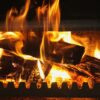A Comprehensive Guide to Choosing Fireplace Fuels in Falls Church, VA
Winter is coming to Falls Church, VA, and with it, the familiar allure of a warm, cozy fireplace. But, choosing the right fireplace fuel can be a challenging task as it can greatly affect the performance, efficiency, and safety of your fireplace. This comprehensive guide by A&T Chimney Sweeps, a reputable fireplace, furnace, dryer vent, gutter cleaning, and repair service provider in Falls Church, VA, will help you navigate the wide array of fireplace fuels available.
1. Wood
Traditionally, wood has been the most common fireplace fuel. It’s readily available, renewable, and can provide a high heat output. However, the type of wood you choose plays a crucial role in its efficiency. Hardwoods like oak, ash, and maple are denser and burn longer with less smoke. Softwoods, such as pine and fir, burn hotter initially but are consumed faster.
Proper seasoning of the wood is also essential as wet or green wood can lead to excessive smoke and creosote buildup in your chimney. This buildup can cause a chimney fire if not regularly cleaned by professionals like A&T Chimney Sweeps.
2. Gas
Natural gas is a popular choice for those who prioritize convenience. Gas fireplaces require less maintenance, produce less mess, and can be operated with a simple switch. They also provide a constant heat supply unlike wood fireplaces that require constant refueling.
However, natural gas fireplaces require a gas line installation which can be costly. Also, the aesthetic appeal of a traditional wood-burning fireplace is missing.
3. Propane
Propane is another convenient fireplace fuel. Like natural gas, it burns cleanly and efficiently, requiring less maintenance. Propane fireplaces also provide a steady heat output and can be operated with a switch.
However, propane is more expensive than natural gas and requires a tank for storage. The tank installation can be a significant project, especially if an underground tank is preferred.
4. Pellets
Pellet fireplaces burn compressed pellets made from wood waste. They burn efficiently, producing less ash and creosote than wood fireplaces. Pellet fireplaces also have a high heat output and are easy to operate.
The downside to pellet fireplaces is the requirement for electricity to run the pellet hopper. Also, the cost of pellets can fluctuate depending on the wood waste market.
5. Bioethanol
Bioethanol fireplaces are a modern, eco-friendly option. They burn bioethanol fuel, which is made from fermented plant sugars. Bioethanol fireplaces produce no smoke or ash and require no flue or chimney, making them easy to install.
However, bioethanol fireplaces have a lower heat output than other fuel options and the fuel can be expensive.
6. Electric
Electric fireplaces require no fuel as they produce heat through electricity. They’re easy to install, require low maintenance, and can be operated with a switch.
However, electric fireplaces provide less heat than other fuel options and can increase your electricity bill.
In conclusion, the best fireplace fuel for you depends on your specific needs and circumstances. Consider factors such as availability, cost, maintenance requirements, heat output, and environmental impact. And, don’t forget to schedule regular cleaning and maintenance with a trusted service provider like A&T Chimney Sweeps to ensure your fireplace operates safely and efficiently.
FAQs:
Q: What is the most efficient fireplace fuel?
A: Pellet fireplaces are considered one of the most efficient due to their high heat output and low waste production.
Q: Is burning wood bad for the environment?
A: Burning wood does release carbon dioxide, a greenhouse gas. However, because trees absorb carbon dioxide as they grow, using sustainably sourced wood can be considered carbon-neutral.
Q: Do I need a professional to install a gas or propane fireplace?
A: Yes, gas and propane installations should be done by a professional to ensure safety and compliance with local regulations.
Q: How often should I have my fireplace cleaned?
A: It depends on how often you use your fireplace. Generally, chimneys should be inspected yearly and cleaned as needed. However, if you notice excessive smoke or a decrease in your fireplace’s efficiency, you should schedule a cleaning with a professional service like A&T Chimney Sweeps.
Q: Are electric fireplaces safe?
A: Yes, electric fireplaces are considered safe as they do not produce any harmful emissions. However, like all electrical appliances, they should be used with care to avoid electrical fires.








